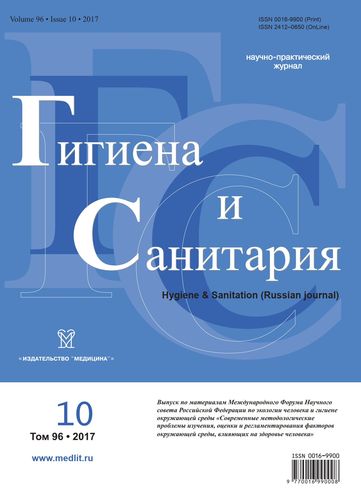Effect of social-hygiene factors on population health in the Primorye Territory
- Authors: Yarygina M.V.1, Kiku P.F.1, Gorborukova T.V.1, Moreva V.G.1, Sabirova K.M.1, Kondratev K.V.1
-
Affiliations:
- Far Eastern Federal University
- Issue: Vol 96, No 10 (2017)
- Pages: 995-1000
- Section: POPULATION HEALTH
- Published: 21.10.2020
- URL: https://ruspoj.com/0016-9900/article/view/640748
- DOI: https://doi.org/10.47470/0016-9900-2017-96-10-995-1000
- ID: 640748
Cite item
Full Text
Abstract
The purpose of the research is to establish the basic social and hygienic mechanisms of the formation of population health in the Primorsky Krai. The study analyzed the main ecodependent diseases: respiratory diseases, urogenital system, skin in the population residing in model points in the coastal and continental bioclimatic zones of the Primorye Territory with a variety of social and environmental performance. According to the suggested hypothesis of social-hygienic study the prevalence rate of ecodependent pathology in the population of the Primorye Territory is influenced by a complex of unfavorable factors of ecological, climatic and socio-hygienic risk, including the underlying factors or their groups not detected by conventional methods, but capable of to have a significant impact. The results showed regional features of the influence of environmental factors, lifestyle on the health of the major demographic groups living in different bio-climatic, social and environmental conditions of urban and rural areas of the region. The backbone force for all groups is a way of life. For urban residents of the coastal zone there is a significant ecological and social impact of environmental factors, while for rural residents — social and hygienic. Under the complex influence of socio-hygienic and climatic factors on the prevalence rate of ecodependent pathology the level of disease was found to be largely dependent on the specific way of life in the ecological and bio-climatic conditions of the region. Among the not detectable factors of socio-hygienic monitoring, a special place was revealed to be occupied by the socio-psychological peculiarities of the production environment and everyday life, which depend on the social (social and educational prospects, social and material satisfaction, job availability and the possibility of further training, environmental comfort, recreation), and individual features (educational level, the possibility of professional, family and individual psycho-emotional characteristics), which confirms the hypothesis of socially-hygienic research. On the basis of survey data with the using the method of multivariate analysis - correlation Pleiades by Terentyev, it was created “Sociometric model conditionality of the formation of population health in the Primorsky Territory.”
About the authors
Marina V. Yarygina
Far Eastern Federal University
Author for correspondence.
Email: yarigina@bk.ru
ORCID iD: 0000-0002-3559-4799
MD, PhD, Associate Professor of the Department of Public Health and Preventive Medicine, School of Biomedical, Far Eastern Federal University, Far Eastern Federal University, School of Biomedicine, Vladivostok, 690950, Russian Federation.
e-mail:yarigina@bk.ru
Russian FederationP. F. Kiku
Far Eastern Federal University
Email: noemail@neicon.ru
ORCID iD: 0000-0003-3536-8617
Russian Federation
T. V. Gorborukova
Far Eastern Federal University
Email: noemail@neicon.ru
ORCID iD: 0000-0002-6032-626X
Russian Federation
V. G. Moreva
Far Eastern Federal University
Email: noemail@neicon.ru
ORCID iD: 0000-0001-8746-2627
Russian Federation
K. M. Sabirova
Far Eastern Federal University
Email: noemail@neicon.ru
ORCID iD: 0000-0003-4217-4829
Russian Federation
K. V. Kondratev
Far Eastern Federal University
Email: noemail@neicon.ru
ORCID iD: 0000-0001-8396-796X
Russian Federation
References
- Onishchenko G.G. Actual problems of hygiene science and practice in the preservation of Public health. Gigiena i sanitariya. 2015; 94(3): 5–10. (in Russian)
- Rakhmanin Yu.A., Mikhaylova R.I. Environment and Health: Priorities for Preventive Medicine. Gigiena i sanitariya. 2014; 93(5): 5–10. (in Russian)
- Unguryanu T.N., Novikov S.M. Demographic and socioeconomic determinants of health risk perception. Gigiena i sanitariya. 2010; (6): 69–72. (in Russian)
- Boev V.M., Tueva N.V., Boev V.V., Vereshchagin N.N. The contribution of natural and man-made, social and economic factors in the formation of the demographic processes in urban and rural areas. Zdorov’e naseleniya i sreda obitaniya. 2008; (9): 12–5. (in Russian)
- Rakhmanov R.S., Gadzhiibragimov D.A., Medzhidova M.A., Kud-ryavtseva O.A. Assessment of the significance of climatogeographic conditions as health risk factors. Gigiena i sanitariya. 2010; 89(2): 44–6. (in Russian)
- Turchaninov D.V., Vil’ms E.A., Glagoleva O.N., Kozubenko O.V., Danilova Yu.V., Gogadze N.V., et al. Approaches to assessment and leading trends of the prevention of the negative impact of the complex of factors of diet and lifestyle on public health. Gigiena i sanitariya. 2015; 94(6): 15–20. (in Russian)
- Shchepin O.P., Medik V.A., eds. The Health of a Regional Population and the Healthcare Service Priorities [Zdorov’e naseleniya regiona i prioritety zdravookhraneniya]. Moscow: GEOTAR-Media; 2010. (in Russian)
- Kiku P.F., Yarygina M.V., Yudin S.S. Lifestyle, Habitat and Health of the population of Primorsky Krai [Obraz zhizni, sreda obitaniya i zdorov’e naseleniya Primorskogo kraya]. Vladivostok: Dal’nauka; 2013. (in Russian)
- Buzinov R.V., Kiku P.F., Unguryanu T.N., Yarygina M.V., Gudkov A.B. From Pomorye to the Primorye: Social-Hygienic and Environmental Problems of Public Health [Ot Pomor’ya do Primor’ya: sotsial’no-gigienicheskie i ekologicheskie problemy zdorov’ya naseleniya]. Arkhangel’sk; 2016. (in Russian)
- Terent’ev P.V. Method of Correlation Pleiades [Metod korrelyatsionnykh pleyad]. Vestnik Leningradskogo universiteta. 1959; (9): 137–41. (in Russian)
- Gorborukova T.V., Kiku P.F., Sakharova O.B. Method of Correlation Pleiades in Socio-hygienic Studies [Metod korrelyatsionnykh pleyad v sotsial’no-gigienicheskikh issledovaniyakh]. Certificate № 2012613168; 2012. (in Russian)
- Kleyn S.V., Vekovshinina S.A., Sboev A.S. Priority risk factors of drinking water and the related with it economical loss. Gigiena i sanitariya. 2016; 95(1): 10–4. (in Russian)
- Rylova N.V. Influence of mineral composition of drinking water on health of children. Gigiena i sanitariya. 2010; 89(3): 43–5. (in Russian)
- Trubinskiy V.V., Maslyuk A.I. Public health risk of chemical composition of clean drinking water. Gigiena i sanitariya. 2011; 90(2): 23–7. (in Russian)
Supplementary files









